Lasiommata schakra
Lasiommata schakra, the common wall, is a species of satyrine butterfly found in South Asia.
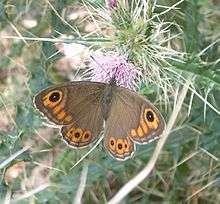
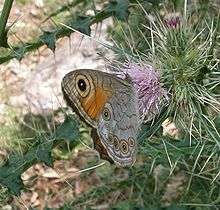
| Common wall | |
|---|---|
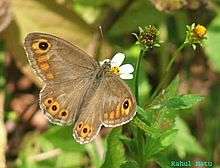 | |
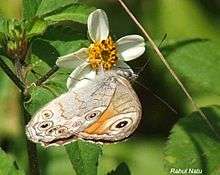 | |
| Scientific classification | |
| Kingdom: | Animalia |
| Phylum: | Arthropoda |
| Class: | Insecta |
| Order: | Lepidoptera |
| Family: | Nymphalidae |
| Genus: | Lasiommata |
| Species: | L. schakra |
| Binomial name | |
| Lasiommata schakra (Kollar, 1844) | |
| Synonyms | |
| |
Description
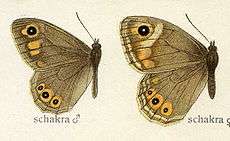
Shows slight sexual dimorphism. Male upperside ground colour silky brown; cilia of both wings whitish. Forewing has a transverse row of four large orange spots, the apical one the largest, bearing a black, white-centred eyespot; beyond the row of orange spots a subterminal dark brown line. Hindwing uniform, but bearing a postdiscal row of from three to six black, white-centred, orange-ringed eyespots. Underside very pale greyish white; forewing: disc orange, outwardly defined by a dark line, two lines across the discoidal cell, and a sinuous discal oblique line beyond its apex not extending to the tornus, orange-brown; subterminal and terminal dark lines; a subapical eyespot, as on the upperside, but with the outer ring paler, and a much smaller ocellus beyond it towards apex of wing. Hindwing has the basal half crossed by two sinuous curved slender lines, a shorter line crossing the cell only, and another short line defining the discocellular veins, orange brown; the curved row of ocelli as on the upperside, but each ocellus with rings of pale ochraceous and of brown, alternately two of each; lastly, a subterminal and a terminal brown line. Antennae brown; head and thorax studded with long dark grey pubescence; abdomen pale brown. Sex-mark present.
Female is similar but on the upperside, the orange spot bearing the ocellus on the forewing inwardly bordered by a broad, pale, short line; the raised band of specialized scales absent.[1]
Wingspan of 56–58 mm.
Distribution
The Himalayas eastwards to Sikkim.[1]
References
- Bingham, C.T. (1905). The Fauna of British India, Including Ceylon and Burma Butterflies. 1 (1st ed.). London: Taylor and Francis, Ltd.